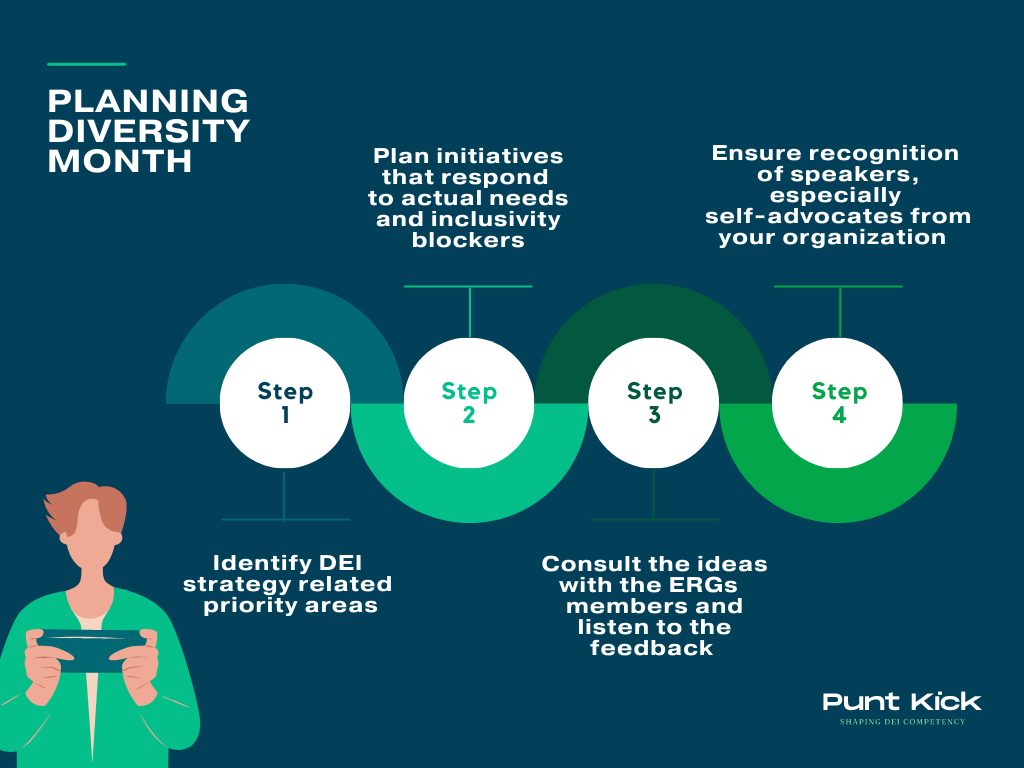
DEI leaders face contradictive expectations
I know from speaking to different organizations that many DEI leaders experience this: the constant balancing out on a wire between contradictive expectations.
No matter what you do and how much genuine commitment stands behind your actions, for some they are too much and not enough for others.
This role often gets romantised but those who lead DEI work in their organizations know how frustrating and lonely it can get.
Self-care for DEI leaders is essential. What can help?

Space for diversity - conference
I'm happy to share that next week I'll have a pleasure to speak at the conference "Space for Diversity" at the Uniwersytet Ekonomiczny w Krakowie.
I'll give a talk "Creating an Inclusive Campus: Strategies and Best Practices for Diversity, Equity, and Inclusion at Universities in the USA and Poland" and also moderate a discussion on identity and intersectionality with dr Ziad Abou Saleh, Edyta Jaśkowiak and Andreas Volk.

The end state in dei is a myth
You can lead inclusively from right where you are on your DEI journey, also by giving yourself permission to be vulnerable about this path, by sharing with your team about your growing pains and lessons you’re taking from mistakes.

Do you use microlearning in you dei work?
I’m curious to see if you and your organizations use microlearning in DEI-related subjects?
Please vote in the survey.

what gets MEASURED gets done
“You’d never look around the office, see smiling faces and think, “Well, I guess our profitability is fine” and this book shows why it matters to measure DEI in the same rigorous, impartial way you measure other critical business objectives.

What questions inclusive leaders ask themselves?
It takes effort of everyone in the organisation to create an inclusive culture, but it's leaders who have a particular impact. It's in their efforts to change their habits of interactions and to pay attention to what they say and do on a daily basis.

six traits that distinguish inclusive leaders
A couple of days ago I wrote a post on leaders inaccurately estimating how inclusive they are: [link]
The same study* showed that #leaders couldn't identify which specific behaviors actually have an impact on being rated as more or less inclusive.
So today a bit more about the six traits or behaviors that distinguish inclusive leaders from others and how to start working on developing those.

DEI work is not a DIY work
Those two sound so alike and a dialogue on how great it is to have a hobby and upcycle things happened a couple of times already.

Leaders estimate INACCURATELY how inclusive they are
The research* involving 3,500 ratings by employees of 450 leaders, found leaders often inaccurately estimate how inclusive they really are

The emotional labour of DEI leaders
Yesterday was the Invisible Work Day and we usually then speak about the invisible work of women. But I wanted to draw attention to the invisible mental and emotional work in the DEI field, done by DEI leaders.
We don’t always acknowledge the emotional labour this work takes and that stands behind good DEI work.

We can do our curiosity better.
There is nothing wrong with being curious… and asking someone “Where are you from?” usually comes from the best intentions.
But it can have the opposite impact to the intended one and turn into a #microaggression.

We are biased, and…
Sometimes the question of bias seem to be taken from two extremes:
We are biased and we can’t do anything about it vs You can quit bias in three simple steps.
This vs that
It’s not “vs” situation though, our brains are too complex for that.

Should DEI trainings be obligatory?
I know there are DEI leaders who share this opinion. I know that cause I’ve recently had some discussions about this very topic. I see the reasons and I acknowledge them, I know they come from the best intentions.
Yet, from where I stand, the DEI trainings should be voluntary.

3 types of threats related to DEI
To effectively address the resistance and prevent it, it's crucial to identify the underlying reasons behind it.

How fluent your organization is in inclusive language?
I often start a conversation on inclusive language with my clients with a reflection: “How diverse your organization is and to what extend your organization’s language reflects that?
The results of the reflection often signal a disconnect between the two.

Art has a profound impact on my DEI work
Art has a profound impact on my DEI work. Some of the most thought-provoking discussions I had on apartheid, neurodiversity, domestic violence or process of learning, I had after visiting an art gallery.

we need more EXPERIENTIAL learning in DEI
Do you also feel we desperately need more engaging activities in DEI training?

High sensitivity is a superpower
The term "Highly Sensitive Person" (HSP) was coined by Dr. Elaine Aron to describe a neutral trait that is present in approximately 20% of both human and non-human populations.

Diversity Month is coming
Ideally, Diversity Month should be the "cherry on top of the cake," a culmination of a year-round commitment to allyship and inclusion.

Diversity is a fact. Is it though?
Diversity is a relational term, it’s about who we are in relation to other people. One cannot be diverse as an individual. For experiencing and understanding diversity we need exposure to it.
